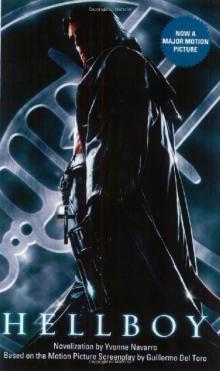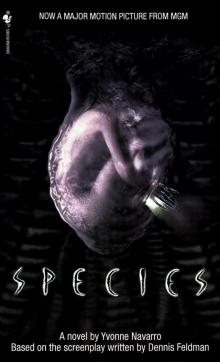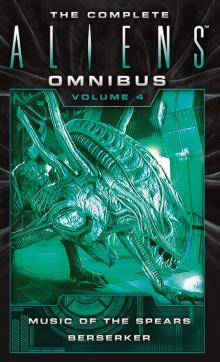- Home
- Yvonne Navarro
Species II Page 3
Species II Read online
Page 3
“Whatever.”
Patrick snickered and bent to his work. “Knock it off, you two. Let’s get down to business.”
Unnoticed against the aft wall, bright beads of condensation had begun a slow drip down the outside of the last of the sample canisters.
Thirty minutes later, the three astronauts had finished their final checks and were strapped into the harnesses of the cockpit chairs. Dennis’s expression had slipped into his standard mask of concentration, a sure sign that what was uppermost in his mind was getting the Excursion free of the Mars orbit and on her way home. His gaze tracked the readouts on the system monitors, his fingers ran confidently over the switch panels. “Control, this is Excursion,” he said briskly. “All systems are go. Request update on the ETD.”
The response was nearly instantaneous. “Excursion, this is Control. You are a go for de-orbit burn. Activate main thruster panel, over.”
“Thank you, Control. De-orbit burn sequence completed . . . now.” Dennis snapped the final toggle switch to the GO position. “We are homeward bound.”
“Roger that, Excursion. Starting propulsion engine countdown. Twenty, nineteen, eighteen . . .”
Dennis looked oyer at Patrick and Anne. “We’re in the money, folks.”
“Seventeen . . .”
He grinned and stretched a hand toward Patrick, who slapped it, then grabbed it in a homeboy shake.
“Sixteen, fifteen, fourteen . . .”
Beneath them, around them, the engines began to pulse with power. Anne gave the other two a thumbs-up, knowing that the low, throaty hum would effectively wipe out all conversation until the Excursion had pulled them out of orbit and set herself into a steady cruising speed. As the ship began to vibrate, Anne turned her attention to the mainframe computer, intent on entering the final log notations for the trip. Only a few feet behind her chair and despite the perfectly monitored, low-humidity air of the small control center, water was now dripping freely off the third orange canister and forming a small puddle on the metal floor.
“Thirteen, twelve, eleven . . .”
Hunched over their tasks and momentarily deafened by the increasing roar of the thruster engines, none of the crew heard or saw the metal band cinching the edges of the sweating sample canister release with a snap, nor did they notice the still tightly sealed lid as it began to bulge.
“Ten, nine, eight, seven . . .”
Eyes locked on the LED countdown display, forehead creased, Dennis deliberately began flicking the first of a long sequence of switches on the control console.
“Six, five, four . . .”
Suspended on the rear wall, a fracture grew between the canister’s lid and body, a break in the regulation quarantine seal. A thin line of slime the same rusty-red color as Martian soil squeezed out, then slid down the side of the orange metal, dripping and melding with the water already beneath it.
“Three . . .”
As the astronaut team counted down its final seconds in the Martian orbit, the spot of sludge on the floor began to bubble and expand—
“Two . . .”
—doubling, then tripling its size.
“One.”
As Dennis Gamble opened his mouth to tell Mission Control that the Excursion’s thruster engines had fired, the mass of cellular muck twisted and reshaped itself into three separate segments—
—which leaped toward the crew of the Excursion with a ghastly chittering wail.
Back Home on Earth
With the successful firing of the thruster engines, the Excursion was on her way home and the back-patting and celebrating at Mission Control in Houston began anew. When the two direct-feed video screens went blank but the status screen kept relaying data, for a moment, one—
—long
—moment,
—no one breathed. Then the communications specialist slammed his hand on a button on his keyboard and his speaker-driven voice cut through the merriment and ground it all to a halt.
“Sir, I have LOS radio blackout. We have lost contact.”
Pandemonium.
The grim announcement sent technicians and specialists vaulting back to their stations. Thomas Duncan, Flight Director for the Excursion Mars Space Landing Mission, strode across the room and stopped before the terrified-looking communications technician. Normally confident, Duncan’s lean face was ghost-white beneath the pale blond of his crewcut, his eyes as wide as those of the young man awaiting his orders. A muscle ticked in one side of his jaw as he scanned the tech’s screen but found nothing there to answer the thousands of questions suddenly jumbling in his mind.
“Activate the emergency satellite network,” Duncan said between clenched teeth.
“Yes, sir.” Young, capable, impeccably trained, the specialist’s fingers were a blur on the keyboard. A final jab at the ENTER key hard enough to make the keyboard jump, and he said, “You have an open line, sir.”
Duncan glanced over his shoulder and saw the people in the viewing room—Senator Ross and all the other family members, not to mention a significant number of NSEG officials—crowded against the glass, their frightened faces grim testimony to the seriousness of the situation.
Duncan snatched at the headset the technician offered him and slipped it on. “Excursion, this is Mission Control,” he barked. “We are on emergency satellite frequency. Do you read?” A pause, longer and longer. “Do you read, Excursion?”
No response.
With a growl Duncan yanked off the headset and flung it at the technician, who barely noticed it as he frantically began typing emergency-check commands into the keyboard, desperately frying to troubleshoot the communications problem.
Around him, dozens of people did the same, rapid-firing orders into headsets and over telephones as their flight director paced the aisles between the consoles like a panicked lion. “Open O-2 pumps,” he snapped at one technician. “Mobile auto-pilot thrusters,” he ordered another. “Bounce the communications beam off the retro satellite. Do it now!” Beneath a red-bordered sign bearing a cigarette beneath the standard circle and slash, Duncan fumbled a cigarette from a pack of Pall Malls in his shirt pocket, then lit it. “Holy Christ,” he muttered. His gaze cut to the viewing room and he sucked in a lungful of smoke in dismay.
Senator Ross had already thrown open the door and was on his way down the stairs. The babble of voices in the control room did nothing to drown out his strong voice. “What’s going on?” he bellowed. “That’s my boy up there!”
Close behind him came the girl—what was her name? Melissa something-or-other, Patrick Ross’s girlfriend. She had her hand to her throat in a classic display of southern feminine dismay, and her greenish-brown eyes had gone huge. Even from where he stood across the control-room floor, Duncan thought he saw her mouth form a single word . . .
Patrick.
In a pleasantly disguised psychiatric ward across the country, Herman Cromwell listened to the words of Peter Jennings—
For the past three minutes, every attempt to communicate with the Excursion has failed. Let us say a prayer for the safety of the astronauts and for the safe return to Earth of this spaceship and its fine, brave crew.
—and went ballistic.
He had an orderly on either side of him, both big men with brawny arms and short tempers.
They couldn’t hold him.
“I told them!” he screamed. “I told them not to go to Mars!” He lunged forward, then back, and forward again, a bucking motion that suddenly set him free. Before the closest orderly could grab him, Cromwell hefted the metal-framed chair in which he’d been sitting only moments before and hurled it at the television set. The screen imploded and hundreds of shards of dark glass sailed over the heads of the residents and orderlies amid the crackle of an electrical short and the hot smell of ozone and sizzling electrical components. One of the other residents began screaming, a high-pitched sound like the yowling of a cat on fire.
The orderly named Joey tackled Cromwell before he could find a
nything else to throw. “Tranq him, damn it!” he hollered as he and Cromwell hit the floor, followed quickly by his coworker. Two more orderlies barreled into the room and flung themselves at the still-struggling Cromwell; in the midst of all the flailing arms and legs, there was a flash of a hypodermic needle sinking into flesh.
Five seconds later, Herman Cromwell sagged, not quite unconscious, to the floor.
Defeated, the communications specialist looked up at Thomas Duncan. “Still no contact, sir. It’s been seven minutes—she’s drifting off course and we can’t explain why the remote pilot functions have been disabled. Without something from the crew, we can’t bring her in.”
Duncan ground his third cigarette butt out against the technician’s console, then turned and snapped at a black-suited woman hovering nearby. “Get me General Metzger.”
She started to acknowledge the order, then blanched at something she saw over her shoulder and backstepped instead. Duncan scowled and turned, then gasped as the lapels of his jacket were crushed in the fists of a red-faced Senator Judson Ross.
“You are not giving up on my boy,” the senator hissed into Duncan’s face. Ross towered over the flight director, his strength fueled by fury and fear for his son’s life. There was no escaping his grip as he shook Duncan to emphasize his words. “Do you hear me? You are not giving up!”
“Senator, please!” Melissa Evans tried to put her hand on Senator Ross’s arm, but he ignored her and shook Duncan again. Trapped, the flight director’s teeth rattled together with the assault.
“You get my boy back, damn you!”
“Sir, I have LOS blackout lift!” the communications specialist a few feet away suddenly shouted. “Repeat—I have LOS blackout lift!” The last word was nearly a shriek of excitement.
Duncan didn’t even notice when Ross released him, just found himself crowding around the technician with everyone else, leaning forward over the man as the tech rapid-fired commands into his keyboard and reinstated Mission Control’s connection to the Excursion. The huge room was silent as the moments ticked past; finally, first one, then the other, of the viewing screens flickered and stabilized, at last showing the serene face of Commander Patrick Ross.
“Mission Control, this is the Excursion. We have experienced a system malfunction, total blackout of telemetry, communications, and life-support operations.”
Still paralyzed with fear, Senator Ross and Melissa stared at the screen, unsure if Patrick and his crew were all right or not.
“I was able to repair the communications connection and reboot the life-support systems. Sorry for the scare.”
As a cheer went up in the Mission Control Center, and indeed, around the world, Senator Judson Ross and Melissa Evans bowed their heads in thankful prayer . . .
. . . While, straitjacketed in a cold and solitary padded cell at the Garberville Psychiatric Institute, a heavily sedated Herman Cromwell still heard the final transmission on the television from the day-nurses’ station around the corner—
“Excursion crew is fine. Headed on de-orbit burn for Big Blue. It’s gonna be good to get home. Over and out.”
—and felt a single, lonely tear slip down his cheek. His whispered words were slurred by the drugs but still came from his heart:
“May God have pity on us all . . .”
1
Five Months Later
“This is Mission Control. Link-up proceeding on Earth-orbit telemetry, shuttle to make Canaveral landing at 00:17 hundred. Over and out.”
For a mission that had been nearly a decade in the making and had taken almost a year of travel time to complete, the end of it came amazingly fast.
The shuttle’s touchdown on the Shuttle Landing Facility was a flight director’s dream. The ground station microwave scan-beam landing system functioned perfectly on final approach, and everything on the surface was timed precisely to the second; the personnel-retrieval vehicle locked itself onto the shuttle without a problem, and the Excursion crew, smiling and healthy, climbed into their seats and were quickly carried away to the Kennedy Space Center’s medical facilities. As part of standard operating procedure, the press was excluded from the initial reintegration; reporters had to be content with waiting in permanently leased facilities at the Space Center or in hotel rooms around the area as they waited their turn at the press conference scheduled for the following day.
And with the press, the whole world waited.
“On preliminary examination, all three of you are in remarkable health, although I’ll continue with more specific blood testing, of course.” Dr. Ralph Orinsky pushed his bifocals lower on his nose so he could peer over the top of them at the three crew members. “In fact, you’re not even exhibiting the usual symptoms of long-term space travel. At the very least, we would have expected each of you to gain a minimum of an inch in height because the spine tends to stretch out during long-term exposure to a weightless environment.” He tapped his pen against the sheaf of papers on the clipboard he was holding. “There’s no evidence of that, however. All three of you are exactly the same height as you were eleven months and fourteen days ago. That’s most unusual.”
“So we’re done here?” Dennis Gamble asked hopefully. It was the first time any of the three had spoken since disembarking from the transport vehicle except to answer questions from the medical team. “We can go?” He shot a glance at the glass partition that separated him, Patrick, and Anne—each stripped down to regulation NASA undergarments—from the rest of the medical facility. A half-dozen nurses and female technicians had found excuses or errands that had allowed them to congregate outside the window and stare in at the returned space team. “Oh, man,” Dennis said now. “Look at that. Surely enough nurses out there to cure what ails me.”
Dr. Orinsky cleared his throat pointedly. “I will remind you, Mr. Gamble, again, that you are under intimate-contact quarantine until we have a chance to conclude our scheduled tests. There are a few people here who require that we perform further in-depth examinations, and the National Space Exploratory Group regulations are going to insist on the standard quarantine period.” His sharp gaze paused on each of them. “This means all of you, of course.”
“Actually, I’m sure that the regulation was meant just for him,” Patrick Ross said with a straight face. “I think it was instituted to save the women of the world.”
“Kiss my butt, Ross,” Dennis grumbled. “It’d better apply to all of us, or I start hollering discrimination.”
“What’s the matter, Dennis?” Anne asked sweetly. “Don’t you feel special?”
Dennis opened his mouth to retort and ended up just shaking his head in defeat amid their laughter.
The next day started bright for the crew from the Excursion, with their first full Earth sunrise in over three quarters of a year. All three of them rose early enough to watch it, thankful for the clear Florida morning; then they met for a breakfast of NASA cafeteria coffee and powdered donuts before heading to the press site in the Launch Complex 39 area for the nine-o’clock news conference that had been arranged by NASA’s public relations people.
“Christ,” Patrick said under his breath as he sat between Anne and Dennis at a table placed on a platform at the front of the auditorium. “How many people are out there? It’s like being tossed to the wolves.”
“Nah,” Dennis said, eyeballing the microphone suspiciously and checking to be sure it wasn’t turned on before continuing. “Wolves are friendlier.” He scanned the expectant faces. “And you’re right—not so damned numerous, either. How many—”
“The auditorium seats ninety, and you can see it’s standing room only,” Patrick said, answering his friend’s unfinished question. “Be grateful. It’s clear now but there’s a storm predicted. If it weren’t for that, we’d be outside in the grandstand and facing three hundred and fifty.”
“You two just behave,” Anne said. The most reticent of the trio, she had plastered a strained smile on her face and was struggling valian
tly to keep it there. “This is going to be hard enough.”
“Oh, I’ll keep your mind off of it,” Dennis promised.
“That’s what I’m afraid of.”
“Get ready, guys,” Patrick warned. “They’re starting the footage, so the rest can’t be far behind.” As he spoke, two television screens above their heads flickered to life; after a flash of blue screen, a carefully edited official NASA version of the journey began to roll simultaneously.
“Ladies and gentlemen,” said NASA’s public relations director, “NASA, as well as the National Space Exploratory Group, welcomes you to this first press conference with the extraordinary crew of the Excursion Mars Space Landing Mission. Please note that our crew members—Commander Patrick Ross, Flight Navigator Dennis Gamble, and Mission Scientist Dr. Anne Sampas, are still recovering from this incredible, seventy-million-mile journey. We ask that questions be limited to one per newsperson, and that you keep your inquiries short and to the point.” The director, a polished woman bearing a strong resemblance to an actress who starred in a popular television series about aliens and secret government files, gave the crowd of reporters a somewhat condescending smile. “We and the crew of the Excursion appreciate your cooperation. Also note that NASA has prepared detailed press kits for all of you, including video clips of the Excursion’s journey, which you may pick up on your way out.”
She stepped back, and despite her request a double dozen of the reporters started firing questions at the same time, creating a completely unintelligible babble. The crew sat there for a few moments, then Patrick Ross finally held up his hand. As the noise died away, Patrick leaned forward and spoke carefully into the microphone. “I think we’ll make this a simple question-and-answer session. I’ll just call on people, one at a time, and we’ll try our best to get to everyone.” He paused. “How about you there, down in front.”
A random choice, and the woman Patrick pointed to was delighted. “Thank you, Commander Ross,” she said as she stood. “I’d like to know if the NSEG has come up with any explanation for the communication breakdown and the failure of the other systems onboard the Excursion.”

 Hellboy
Hellboy Concrete Savior
Concrete Savior Species
Species AfterAge
AfterAge Ultraviolet
Ultraviolet Highborn
Highborn Species II
Species II Aliens Omnibus 4
Aliens Omnibus 4 Paleo
Paleo Elektra
Elektra